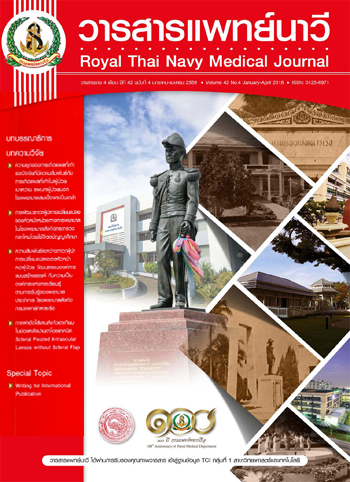การพัฒนาภาวะผู้นำการเปลี่ยนแปลงของหัวหน้าหน่วยทางการพยาบาลในโรงพยาบาลสังกัดกระทรวงกลาโหมโดยใช้จิตตปัญญาศึกษา
Main Article Content
Abstract
The research objectives were to (1) study the state of contemplative education to
develop the transformational leadership of the nursing unit’s head in the hospital under
the jurisdiction of the Ministry of Defense (2) create curriculum for transformational leadership
development of the nursing unit’s head in the hospital under the jurisdiction of the
Ministry of Defense by using contemplative education and (3) evaluate the curriculum for
transformational leadership development.
These three steps were as follows:
Step One : Study state of contemplative education to develop the transformational
leadership of the nursing unit’s head in the hospital under the Jurisdiction of the Ministry
of Defense by interviewing 21 experts. The instrument was a structured interview and analysis
data with content analysis.
Step Two : Create the curriculum for transformational leadership development of the
nursing unit’s head in the hospital under the Jurisdiction of the Ministry of Defense by using
contemplative education with data from the step one to (1) Create curriculum draft which
contained four units of study (2) Evaluated by fives experts for coherence and appropriateness
and (3) Improve the curriculum in accordance with experts’ suggestion.
Step Three : Evaluate the curriculum by using it in experimentation involving a sample
population of 31 head nurse or assistant head nurses of Somdech Phra Pinklao Hospital
in the form of one group pre-test post-test design, the instrument used for evaluation was
transformational leadership perception and satisfaction evaluation. Data were analyzed by
mean and standard deviation.
The results were as follow ;
Section 1 : The state of contemplative education to develop the transformational
leadership of the nursing unit’s head in the hospital under the Jurisdiction of the Ministry
of Defense revealed that the contemplative education was an abstract concept and difficult
to understand and practice ; lack of policy and contemplative education curriculum ; and
nursing unit’s head lack of knowledge, understanding and motivation for self development
by contemplative education.
Section 2 : The results of curriculum draft consisted four units and deemed appropriate
at a high to highest level and exhibited coherence in respect to all components.
Section 3 ; the results of curriculum evaluation showed that the level of post self-assessment
of transformational leadership by nursing unit’s head with an average higher
score than the pre self-assessment in all aspects at the statistically significant level of .05
and eight weeks after the training was completed showed there was no statistically significant
and the satisfaction score was at high level.
Article Details

This work is licensed under a Creative Commons Attribution-NonCommercial-NoDerivatives 4.0 International License.
References
2. สำนักการพยาบาล กรมการแพทย์ กระทรวงสาธารณสุข. รายงานการวิจัย: ระบบบริหารงานพยาบาลที่พึงประสงค์. กรุงเทพมหานคร: องค์การสงเคราะห์ทหารผ่านศึก; 2552.
3. รัชนี สีดา. แผนพัฒนาการพยาบาลและผดุงครรภ์แห่งชาติ (ฉบับที่ 2). กรุงเทพมหานคร: ศิริยอดการพิมพ์; 2552.
4. น้ำฝน โดมกลาง, สุชาดา รัชชุกุล. บทบาทหัวหน้าหอผู้ป่วยโรงพยาบาลศูนย์ที่พึงประสงค์ในศตวรรษหน้า (พ.ศ. 2551-2560). วารสารพยาบาลศาสตร์จุฬาลงกรณ์มหาวิทยาลัย 2551; 20(3): 16-28.
5. บุญใจ ศรีสถิตย์นรากูร. ภาวะผู้นำและกลยุทธ์การจัดการองค์การพยาบาลในศตวรรษที่ 21. กรุงเทพมหานคร: โรงพิมพ์แห่งจุฬาลงกรณ์มหาวิทยาลัย; 2550.
6. Polifko-Harris K. Case applications in nursing leadership & management. New York: Thomson/Delmar Learning; 2004.
7. สุเทพ พงศ์ศรีวัฒน์. ภาวะผู้นำ ทฤษฎีและปฏิบัติ: ศาสตร์และศิลป์สู่ความเป็นผู้นำที่สมบูรณ์. พิมพ์ครั้งที่ 2. เชียงราย: มหาวิทยาลัยราชภัฏเชียงราย; 2548.
8. Curtis EA, Vries J, Sheerin FK. Developing Leadership in nursing: Exploring core factors. Br J Nurs. 2011; 20(5): 306-9.
9. Heller BR, Drenkard K, Esposito-Herr MB, Romano C, Tom S, Valentine N. Educating nurses for leadership roles. J Contin Educ Nurs 2004; 35(5): 203-10.
10. Nwigboji OS. Transformational Leadership in nursing: The case of Ebonyi State in Nigeria. International Research Journal of Public and Environmental Health 2014; 1(10): 202-06.
11. Ibraheem S, Mohammad S, Al-Zeaud HA, Essam Batayneh AM. The relationship between transformational leadership and employees’ satisfaction at Jordanian private hospital. Business and Economic Horizons 2011; 5(2): 35-46.
12. Bass BM, Avolio BJ. Improving Organization Effectiveness Through Transformational Leadership. Thousand Oaks: Sage; 1994.
13. ประเวศ วะสี. การเรียนรู้ใหม่ไปให้พ้นวิกฤติ. กรุงเทพมหานคร: ร่วมด้วยช่วยกัน; 2550.
14. วิจักขณ์ พานิช. เรียนรู้ด้วยใจอย่างใคร่ครวญ การศึกษาดั่งเส้นทางแสวงหาทางจิตวิญญาณ. กรุงเทพมหานคร: ภาพพิมพ์; 2550.
15. Khayankij, S. The Implementation of Contemplative Education in the Assessment and Evaluation of Young Children Course. Asia-Pacific Journal of Research in Early Childhood Education 2012; 6(2): 85-99.
16. นฤมล อเนกวิทย์. การพัฒนาหลักสูตรจิตตปัญญาศึกษาสำหรับนักศึกษาพยาบาล. [ดุษฎีนิพนธ์ศึกษาศาสตรดุษฎีบัณฑิต]. มหาวิทยาลัยขอนแก่น; 2552.
17. Delahaye BL. Human Resource Development: Adult learning and knowledge management. 2nd ed. Queensland: John Wiley & Sons; 2005.
18. Knowles MS, Holton III EF, Swanson RA. The adult learner: The definitive classic in adult education and human resource development. 8th ed. New York: Routledge; 2015.
19. Tyler RW. Basic principles of curriculum and instruction. 4th ed. Chicago: University of Chicago Press; 1975.
20. ธนา นิลชัยโกวิทย์, อดิศร จันทรสุข. ศิลปะการจัดกระบวนการเรียนรู้ เพื่อการเปลี่ยนแปลง: คู่มือกระบวนการจิตตปัญญา. นครปฐม: ศูนย์จิตตปัญญาศึกษามหาวิทยาลัยมหิดล; 2552.
21. สภาการพยาบาล. แผนพัฒนาการพยาบาลและการผดุงครรภ์แห่งชาติ ฉบับที่ 3 (พ.ศ.2555-2559). นนทบุรี: สภาการพยาบาล; 2555.
22. El-Fatah RA, Gad SA, El-Demerdash SM. An Educational Program about Nursing Managers’ Transformational Leadership, Conflict management Styles and Decision Making Effectiveness. Journal of Nursing and Health Science 2014; 3(3): 42-56.
23. จิรัฐกาล พงศ์ภคเธียร. จิตตปัญญาศึกษา การเรียนรู้สู่จิตสำนึกใหม่. กรุงเทพมหานคร: สวนเงินมีมา; 2553.
24. Huston C. Preparing nurse leaders for 2020. The Journal of Nursing Management 2008;16(8): 905-11.
25. McCloughen A, O’Brien L, Jackson D. Journey to become a nurse leader mentor: past, present and future influences. Nurs Inq 2014; 21(4): 301-10.
26. จำเนียร จวงตระกูล. การพัฒนาทรัพยากรมนุษย์: ทฤษฎีและการปฏิบัติ. กรุงเทพมหานคร: ศูนย์กฎหมายธุรกิจอินเตอร์เนชั่นแนล; 2553.
27. สงัด อุทรานันท์. พื้นฐานและหลักการพัฒนาหลักสูตร (พิมพ์ครั้งที่ 3). กรุงเทพมหานคร: โรงพิมพ์มิตรสยาม; 2532.
28. ชูศรี สุวรรณโชติ. หลักสูตรและการพัฒนาหลักสูตร. กรุงเทพมหานคร: ทิชซิ่งเอ็ด; 2544.
29. Taba H. Curriculum Development: Theory and Practice. New York: Harcourt, Brace & World; 1962.
30. Bishop G. Curriculum Development. London: Macmillan; 1985.
31. Blanchard PN, Thacker JW. Effective training: Systems, strategies and practices. 3rd ed. New Jersey: Pearson Prentice-Hall; 2007.
32. Henson K. Curriculum Planning: Integrating Multiculturalism, Constructive and Education Reform. Boston: McGraw-Hill; 2001.
33. ชลลดา ทองทวี, จิรัฐกาล พงศ์ภคเธียร. รายงานผลการดำเนินงานฉบับสมบูรณ์ โครงการวิจัยและจัดการความรู้จิตตปัญญาศึกษา. กรุงเทพมหานคร: สำนักงานกองทุนสนับสนุนการสร้างเสริมสุขภาพและศูนย์จิตตปัญญาศึกษา มหาวิทยาลัยมหิดล; 2551.
34. ฆนัท ธาตุทอง. สอนคิด: การจัดการเรียนรู้เพื่อพัฒนาความคิด. นครปฐม: เพชรเกษมการพิมพ์; 2554.
35. ศิริรัตน์ จำปีเรือง, อมรรัตน์ วัฒนาธร, พูลสุข หิงคานนท์, วารีรัตน์ แก้วอุไร. การพัฒนาหลักสูตรเสริมสร้างคุณลักษณะที่พึงประสงค์ตามกระบวนการสุนทรียสนทนาสำหรับนักศึกษาพยาบาล. วารสารศึกษาศาสตร์มหาวิทยาลัยนเรศวร 2556; 15(2): 9-15.
36. ชาญ สวัสดิ์สาลี. คู่มือการประเมินและติดตามผลการฝึกอบรมสำหรับผู้รับผิดชอบโครงการฝึกอบรมสัมมนา. กรุงเทพมหานคร: สวัสดิการสำนักงาน ก.พ.; 2551.


